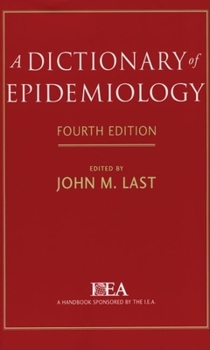A Dictionary of Epidemiology
Select Format
Select Condition 
Book Overview
Dictionary making never ends because languages are always changing. Widely used throughout the world, this book will continue to serve as the standard English-language dictionary of epidemiology in its Fourth Edition. It covers all the common terms used in epidemiology and many from related fields such as biostatistics, infectious disease control, health promotion, genetics, clinical epidemiology, health economics, and medical ethics. The definitions are clear and concise, but there is space for some brief essays and discussions of the provenance of important terms. Sponsored by the International Epidemiological Association, the dictionary represents the consensus of epidemiologists in many different countries. All the definitions were reviewed repeatedly by an international network of contributors from every major branch of epidemiology. They are authoritative without being authoritarian. The Fourth Edition contains well over 150 new entries and substantial revisions of about the same number of definitions, plus a dozen new illustrations. Many of the new terms relate to methods used in environmental and clinical epidemiology.
Format:Paperback
Language:English
ISBN:0195141695
ISBN13:9780195141696
Release Date:December 2000
Publisher:Oxford University Press, USA
Length:224 Pages
Weight:0.76 lbs.
Dimensions:0.8" x 8.8" x 5.9"
Customer Reviews
5 ratings
excellent book for master's class in epidemiology
Published by Thriftbooks.com User , 15 years ago
It explains various defination in epidemiology with excellent explanation. Great source of help for my master's program in research.
A new edition that incorporates the most recent developments in epidemiology
Published by Thriftbooks.com User , 16 years ago
The Dictionary of Epidemiology, sponsored by the International Epidemiology Association, is a 290-page book containing approximately 2600 definitions of words, acronyms and concepts used in epidemiology. It comprises a short reader guide on how best to use the Dictionary, and a reference section complemented by a bibliography. Compared to the four previous editions, the fifth edition incorporates the developments of epidemiologic activity over the last ten years: evidence-based medicine, genetic epidemiology, causal models and graphs. The Dictionary can be of interest to a wide audience of people, scientists or not, who either just discovered or are familiar with epidemiology.
The Absolute Best Resource for Epidemiologists
Published by Thriftbooks.com User , 16 years ago
As a research and teaching assistant, as well as a 2nd year Epidemiology student, I have found this to be the absolute BEST book for resources within the subject. I have used this book to grade papers against (with definitions), and have used it in my own understanding of forgotten or convoluted concepts. If you want a very accurate, succinct definition of everything epi, you need this book. In fact, if you are involved in Epi in ANY way, you need this book. It is a wonderful book for an even better price. I carry it with me at all times.
Extremely helpful
Published by Thriftbooks.com User , 18 years ago
I'm a first year student in a doctoral program in epidemiology. This book has been a life saver!
"The" dictionary of epidemiology
Published by Thriftbooks.com User , 24 years ago
One of the major problems with studying the field of epidemiology is the inconsistency of terminology that is used. This is because the field is relatively young, is actively evolving and has developed from multiple other disciplines including the social sciences as well as the medical sciences and statistics. As a result, it can be both confusing and frustrating for the student. This dictionary is the "bible" of terminology for the fireld, in part because there is no other. This should be an absolute requirement for the shelf of every student in the field of epidemiology. Even experienced epidemiologists are encouraged to have a copy for reference purposes. The only caution is that a new edition is due out soon. It can only be better than the first edition. Get it.





